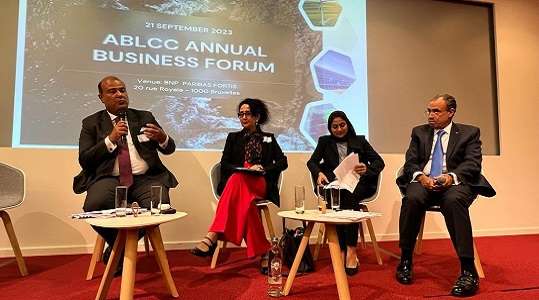The Secretary-General of the Union of Arab Chambers, Dr. Khaled Hanafi, participated in the “Annual Arab-Belgian-Luxembourg Business Forum” which was held in the Belgian capital, Brussels, on September 21, 2023, under the title: “Building Strong Partnerships to meet the challenges and opportunities of sustainable development.” In his speech, “The Reality and Direction of the Arab Countries towards Achieving Sustainable Development,” he reviewed that “the Arab world faces great challenges in the field of sustainability and achieving social, economic and environmental goals such as the high poverty gap, the extremely dry climate, severe water scarcity, high energy consumption and oil pollution and gas for the environment.”
Dr. explained. Khaled Hanafi said, “Despite the challenges facing the Arab world in the field of sustainability, ten countries were able to achieve a score of 66 or higher in the 2023 index, and this is a slight improvement compared to only 6 countries in the previous year, 2022.” These countries are Tunisia, Morocco, Algeria, Jordan, the Emirates, Egypt, Oman, Saudi Arabia, Lebanon and Qatar.
He noted, “Although many or most of the 22 Arab countries received a “red” rating in the framework of implementing the 17 United Nations Sustainable Development Goals, Goal 5 of the Sustainable Development Goals (gender equality) remains the most important challenge throughout the world. The world. The region is also greatly concerned with achieving Sustainable Development Goal 2 (Zero Hunger) and Sustainable Development Goal 8 (Decent Work and Food Provision). Challenges also remain in relation to SDG 3 (good health and well-being), SDG 6 (clean water and sanitation), SDG 9 (industry, innovation and infrastructure), and SDG 6 (clean water and sanitation). 14 of the Sustainable Development Goals (life below water) and 16 of the Sustainable Development Goals (peace, justice and strong institutions).”
He said: “The five most challenging Sustainable Development Goals for North African countries are Goal 2 (Zero Hunger), Goal 3 (Good Health and Well-Being), Goal 5 (Gender Equality), Goal 8 (Decent Work and Economic Growth), and Goal 14 (Life Underwater). In addition, there are still significant challenges regarding the innovation indicator (R&D expenditures). As for the Gulf Cooperation Council countries, they face major challenges with regard to Sustainable Development Goal 5 (gender equality), Goal 6 (clean water and sanitation), Goal 12 (responsible consumption and sanitation), and Goal 13 (climate change). Significant challenges remain related to health (prevalence of obesity), water scarcity, clean energy, and air quality. While for the Levant, it is the only group that has two green goals on the Sustainable Development Goals board, as Lebanon got the green color in the first goal of the Sustainable Development Goals (eradicating poverty), while Palestine got the green color in Goal 15 of the Sustainable Development Goals ( life on earth). While the Levant received red scores in Sustainable Development Goals 5 (gender equality) and Goal 8 (decent work and economic growth). Other remaining challenges relate to health (obesity prevalence and subjective well-being), innovation (research and development expenditures), and pollution.”
Dr. Khaled Hanafi saw that “Many of the Sustainable Development Goals, from clean water and good sanitation to quality education, are closely linked to poverty levels and economic progress across a region that continues to have difficulty eradicating poverty due to differences in wealth distribution. Especially in North African countries that have not yet achieved the second goal of the Sustainable Development Goals, “Eliminating Hunger,” while the United Arab Emirates was able to achieve the first goal of the Sustainable Development Goals (eliminating poverty), as well as achieving social development (reducing gender-related inequality, income and energy).”
He stressed, “With regard to environmental development goals, with regard to renewable energy, the Arab countries have a high potential for wind and solar energy projects, as the natural conditions are suitable for them to increase reliance on clean energy, as most of them are part of the solar belt.” Pointing out that "the abundance of natural gas reserves paves the way for Arab countries to lead hydrogen projects and become major hydrogen exporters."
The Secretary-General of the Union noted, “With the twenty-seventh session of the Conference of the Parties being held in Egypt, and preparations for the twenty-eighth session of the Conference of the Parties in the United Arab Emirates, the region is in an ideal position to address the problem of climate change by taking comprehensive and coherent measures.”
Source (Union of Arab Chambers)

